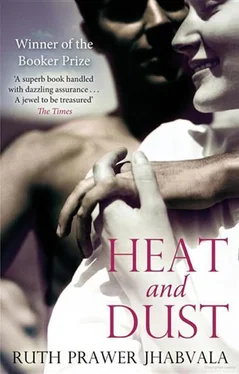She was sitting up in her bed. For all she was so thin and white, she did look tough, toughened-up. A ghost with backbone. I looked down again at the figures sprawled under the white street lights outside A.'s Hotel. It seemed to me that she was right: they did look like souls in hell.
16 February. Satipur. I have been very lucky and have already found a room here. I like it very much. It is large, airy, and empty. There is a window at which I sit and look down into the bazaar. My room is on top of a cloth-shop and I have to climb up a flight of dark stairs to get to it. It has been sub-let to me by a government officer called Inder Lal who lives with his wife and mother and three children in some poky rooms crammed at the back of a yard leading from the shop. The shop belongs to someone else and so does the yard. Everything is divided and sub-divided, and I'm one of the sub-divisions. But I feel very spacious and private up here; except that I share the bathroom facilities down in the yard, and the little sweeper girl who is attached to them.
I think my landlord, Inder Lal, is disappointed with the way I live in my room. He keeps looking round for furniture but there isn't any. I sit on the floor and at night I spread my sleeping-bag out on it. The only piece of furniture I have so far acquired is a very tiny desk the height of a foot-stool on which I have laid out my papers (this journal, my Hindi grammar and vocabulary, Olivia's letters). It is the sort of desk at which the shopkeepers do their accounts. Inder Lal looks at my bare walls. Probably he was hoping for pictures and photographs — but I feel no need for anything like that when all I have to do is look out of the window at the bazaar below. I certainly wouldn't want to be distracted from that scene. Hence no curtains either.
Inder Lal is far too polite to voice his disappointment. All he said was "It is not very comfortable for you," and quickly lowered his eyes as if afraid of embarrassing me. He did the same when I first arrived with my luggage. I had not hired a coolie but had hoisted my trunk and bedding on to my shoulders and carried them up myself. Then too — after an involuntary cry of shock — he had lowered his eyes as if afraid of embarrassing me.
It would have been easier for him if I had been like Olivia.
She was everything I'm not. The first thing she did on moving into their house (the Assistant Collector's) was smother it in rugs, pictures, flowers. She wrote to Marcia:
"We're beginning to look slightly civilised." And again, later: "Mrs. Crawford (Collector's wife — the Burra Memsahib) came to inspect me today in my nest. I don't think she thinks much of me or the nest but she's ever so tactful! She told me she knows how difficult the first year always is and that if there is any little thing she could possibly do to ease things for me, well I must just consider her to be always there. I said thank you (demurely). Actually, her being there is the only difficult thing — otherwise everything is just too perfect! If only I could have told her that. "
I have already seen the house in which Douglas and Olivia lived. In fact, there has been a very lucky coincidence — it turns out that the office where Inder Lal works is right in what used to be the British residential area (known as the Civil Lines). Inder Lal's own department, Disposal and Supplies, is in what was the Collector’s house (Mr. Crawford’s, in 1923). Douglas and Olivia’s bungalow now houses the Water Board ,the municipal Health Department, and a sub-post office. Both these houses have, like everything else, been divided and sub-divided into many parts to fulfil many functions. Only the Medical Superintendent’s house has been kept intact and is supposed to be a travellers’ rest-house.
20 February. This morning I dropped in on the two ladies of the Inder Lal family — his wife, Ritu, and his mother. I don’t know whether I caught them at a moment of unusual confusion or whether this is the way they always live but the place was certainly very untidy. Of course the rooms are poky and the children still at the messy stage. Ritu swiftly cleared some clothes and toys off a bench. I would have preferred to sit on the floor as they did, but I realised that now I had to submit to all the social rules they thought fit to apply to my case. The mother-in-law, in a practised hiss aside, gave an order to the daughter-in-law which I guessed to be for my refreshment. Ritu darted out of the room as if glad to be released, leaving me and the mother-in-law to make what we could of each other. We smiled, I tried out my Hindi (with scant success — I must work harder at it!), we made hopeful gestures, and got nowhere. All the time she was studying me. She has a shrewd, appraising glance — and I can imagine how she must have gone around looking over girls as possible wives for her son before finally deciding on Ritu. Quite instinctively, she was adding up my points as well ,and alas I could guess what her sum came to.
I have already got used to being appraised in this way in India. Everyone does it everywhere — in the streets, on buses and trains: they are quite open about it, women as well as men, nor do they make any attempt to conceal their amusement if that is what one happens to arouse in them. I suppose we must look strange to them, and what must also be strange is the way we are living among them — no longer apart, but eating their food and often wearing Indian clothes because they are cooler and cheaper.
Getting myself a set of Indian clothes was one of the first things I did after settling down in Satipur. I went to the cloth-stall downstairs and then next door where there is a little tailor sitting on a piece of sacking with his machine. He measured me right.there and then in his open shop in full view of the street, but with such care to keep hi, distance that his measures were too approximate for any kind of fitting. As a result my clothes are very loose indeed but they serve their purpose and I'm glad to have them. I now wear a pair of baggy trousers tied with a string at the waist such as the Punjabi peasant women wear, and their kind of knee-length shirt. I also have a pair of Indian sandals which I can shuffle off and leave on thresholds like everyone else. (They are men's sandals because the women's sizes don't fit me). Although I'm now dressed like an Indian woman, the children are still running after me; but I don't mind too much as I'm sure they will soon get used to me.
There is one word that is often called after me: hijra. Unfortunately I know what it means. I knew before I came to India, from a letter of Olivia's. She had learned it from the Nawab who had told her that Mrs. Crawford looked like a hijra (Great-Aunt Beth was, like me, tall and flat-chested). Of course Olivia also didn't know what it meant, and when she asked; the Nawab shouted with laughter. But instead of explaining he told her "I will show you," and then he clapped his hands and gave an order and after some time a troupe of hijras was brought and the Nawab made them sing and dance for Olivia in their traditional style.
I have also seen them sing and dance. It was when I was walking back with Inder Lal from seeing his office. We were quite near home when I heard a noise of drums from a side-street. Inder Lal said it was nothing worth looking at — "a very common thing," he said — but I was curious so he reluctantly accompanied me. We went through a succession of alleys winding off from each other and then we entered an arched doorway and went down a passage which opened up into an inner courtyard. Here there was the troupe of hijras eunuchs — doing their turn. One played a drum, others sang and clapped their hands and made some dancing motions. There was a cluster of spectators enjoying the performance. The hijras were built like men with big hands and flat chests and long jaws, but they were dressed as women in saris and tinsel jewellery. The way they danced was also in parody of a woman's gestures, and I suppose that was what amused people so much. But I thought their faces were sad, and even when they smirked and made suggestive gestures to what I guessed to be suggestive words (everyone laughed and Inder Lal wanted me to come away), all the time their expression remained the worried workaday one of men who are wondering how much they are going to be paid for the job.
Читать дальше












